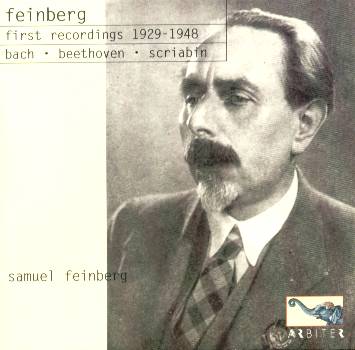Feinberg’s Well-Tempered Clavier, a titanic recording,
would be enough to keep his name imperishably alive in the annals of
great Bach playing. A pupil of Goldenweiser, of whom he wrote with typical
acumen and intellectual elevation, Feinberg was an associate and early
exponent of the music of Scriabin (who admired the pianist greatly)
– the Scriabin discs on this Arbiter disc are I believe the only extant
Feinberg recordings of the composer’s music. He was also an avowed proponent
of contemporary Russian composers – Miaskovsky, Stanchinsky and Prokofiev
prominent amongst them though there were of course many others. Amongst
Russian pianists he was one of the leading exponents of Bach and Beethoven
and was an influential figure not least as a profoundly important teacher.
Before the export ban on musicians in the early thirties
Feinberg could travel to Germany where he gave recitals and recorded
for Polydor. Arbiter’s attractive programme notes – which consist in
the main of a fascinatingly incisive and detailed transcription of a
1946 interview between the pianist and A V Vitsinsky – also include
a sample programme from a 1929 Berlin concert. No doubt to promote his
recent recordings – or maybe as a trial run for the recordings themselves
– the Vivaldi-Feinberg Concerto, Appassionata and Stanchinsky’s Prelude
in Canon Form are all, as it were, on the menu. I first came to Feinberg
not through these early discs or even through the Well-Tempered Clavier
but through the Chorale Prelude recordings of the 1950s and 1960s. In
particular the 1962 discs, recorded barely a week before the pianist’s
death from cancer, possess a transformative and transcendent beauty
impossible to convey in mere words. And of these the recording of Allein
Gott in der Höh sei Ehr is charged with such spiritual
depth that it is numbing in its intensity (it may still be available
on BMG 74321 25175 2 as part of the Russian Piano School series). Therefore
in the light of my relative familiarity with the later Feinberg it has
been a notably instructive experience to listen to these, his first
records, but ones made when he was by no means a callow youth. He was
nearing forty when he first went into the Berlin recording studios.
His Chromatic Fantasy and Fugue with which the recital
begins was actually recorded in Moscow in 1948. It is dramatic and romantic,
a leonine traversal but one sensitively shaped. It rises to peaks of
declamatory grandeur whilst retaining utter fluency and levels of characterisation.
More Russian discs follow; the Prelude in G from the late 1930s is occasionally
overstressed (some rather heavy accents) but he brings out the occasionally
gritty inwardness of the A minor Fugue. When we turn to those 1929 Polydors
we encounter a rather more galvanic artist. Wer nur den lieben Gott
läßt walten for example is exceptionally thunderous
and outsize and his Appassionata one of the most driven you will hear.
The opening Allegro assai is fissure laden but very exciting (there
was clearly a tough side join at 3.00) and whilst the slow movement
is not overburdened with sentiment it’s still affectingly done. The
finale is not always intact technically but blazes defiantly – a heroic
maybe somewhat intemperate reading at times but unignorable as an artistic
statement whatever ones reservations.
His Schumann will divide opinion; it sounds rather
brisk to me (Jagdlied especially) and Vogel als prophet
lacks mystery. His Liadov however is exquisitely limpid and of the four
tiny movements of his own Op 11 Suite – in etude form and dedicated
to his revered teacher Goldenweiser - the highlight is the last, a Tranquillo
e cantabile of elliptical tracery and Scriabinesque elusiveness.
Stanchinsky was a composer Feinberg promoted; he plays the Prelude in
canon form with admirable clarity and forthright projection. The three
Scriabin pieces, barely seven minutes’ worth of music, are as I said
the only known survivors of his extensive repertoire. It’s tempting
to overemphasize his direct line to authorial imprimatur but listening
to the way in which Feinberg binds the F sharp Mazurka is as memorable
as the way in which he most movingly conveys its ultimately unresolved
tension. His elegance is demonstrated with unambiguous assurance in
the last piece of this disc, Fragilité, another 1929 Polydor.
Transfers are first class, the printed interview offers
rich rewards to the attentive listener and the disc restores to circulation
an admirable selection of repertoire, catching him in early to late
middle age. He had not yet reached the true plateau of his greatness
but this is Feinberg, forceful and sensitive, and an artist very well
worth getting to know.
Jonathan Woolf

